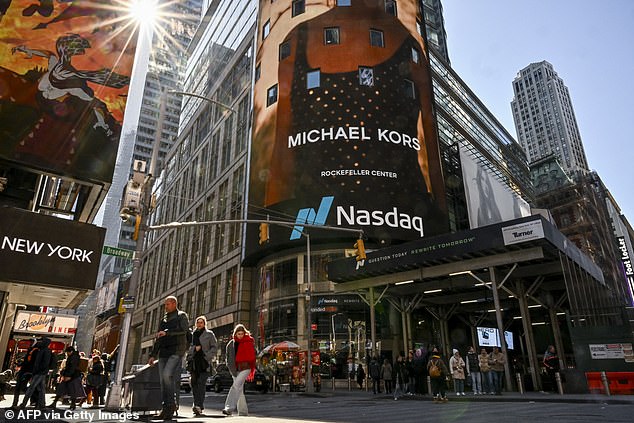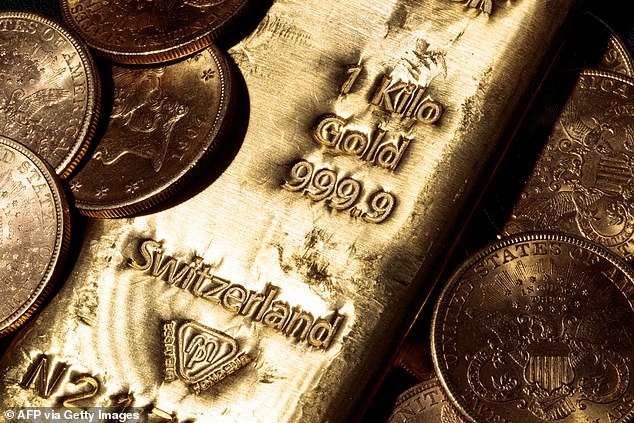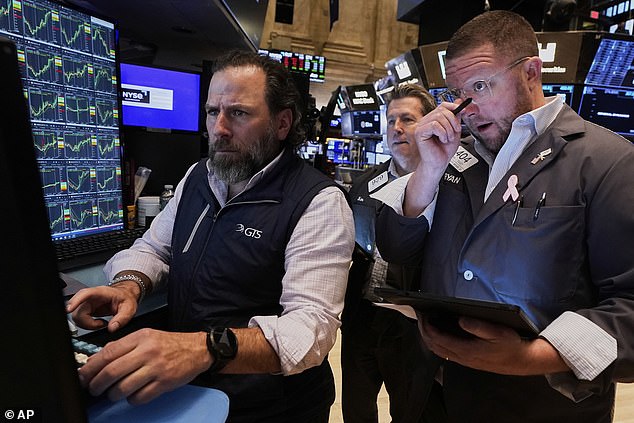In Wall Street, there’s a new slogan – ‘Sell America’.
For a country that regards itself as the epicentre of capitalism, with a thriving culture of private shareholding, this is tantamount to sacrilege.
It’s not just the tariffs: a rout this week was provoked by Donald Trump’s threat to get rid of Jerome Powell, chairman of the US central bank, the Federal Reserve. The ever-mercurial president softened his tone, bringing some relief to share prices. But Trump is still volatile and the anxiety on the Street over what he might do or say next has not gone away.
Thanks largely to Trump’s antics, accompanied by a growing concern he is intent on dismantling the world economic order as we know it, the Dow Jones index of US shares is down around 5 per cent so far this year.
The S&P has fallen 7 per cent and the tech-heavy Nasdaq is down 12 per cent.
The reason Trump’s attack on Powell spooked the markets is that the ‘Fed’ is independent of government, like the Bank of England.
This means its judgments on interest rates are made based on the economy, not party politics.
So the markets were not impressed with the President’s outspoken remark that the Fed chief’s ‘termination cannot come fast enough’ and that he is a ‘major loser’ for his refusal to cut interest rates.

The tech-heavy Nasdaq is down 12 per cent this year
This is just the latest debacle. The ‘Sell America’ mantra points to mounting anxiety that the country is losing its appeal as a destination for investors from around the world, including the UK.
That may be premature and America has bounced back many times. But the Wall Street rollercoaster is certainly an alert to reassess your investments.
The trouble is not confined to shares. The dollar, which was hit by Trump’s attack on Powell, has seen big falls in recent months.
The greenback is usually seen as a safe haven in times of turbulence, but this time there has been a flight into different shelters such as gold, the Japanese yen and the Swiss franc.
This week the International Monetary Fund (IMF) pointed to the harm Trump’s tariffs and other policies may do to the US economy, as it downgraded its forecast for growth from 2.7 per cent to 1.8 per cent.
Even some of the most fervent believers in US assets are now falling out of love. They include Alain Bokobza, head of asset allocation at the Societe General bank, who has been telling investors to reduce their exposure to American markets and the dollar.
US Treasury bonds – basically IOUs issued by the government – are another traditional safe haven for investors, who trust Uncle Sam not to default on debt.
But the bond market too has been caught up in the recent turmoil. Traders are concerned that foreign investors, who hold around 30 per cent of America’s $30trillion in debt, could flee Treasuries.

Jason Hollands of Bestinvest points out that a 16 per cent drop in the S&P since February is equivalent in sterling terms to a tumble of 21 per cent
Stuart Clark of Quilter says even the discussion of actions that could undermine the independence of the Fed, such as sacking its chairman, can create a big negative impact on bond markets.
It is, he says, ‘similar to the impact of the Liz Truss’ mini-budget on the UK gilt market in 2022 – but with far greater repercussions for the global financial system due to the size and significance of the US treasury market.’
Big falls in US shares have, for UK investors, been amplified by the descent of the dollar. As Jason Hollands of Bestinvest points out, a 16 per cent drop in the S&P since February is equivalent in sterling terms to a tumble of 21 per cent.
So, should you Sell America? And if so, where might be better places to put your money? Might there even be some opportunities to snap up US shares at a bargain price?
Here’s what you need to know now.
ACTION PLAN
If you can afford to take a long-term view, this is not the moment for panic selling of US shares or any others since this would crystallise your losses.
Ian Lance, manager of the Temple Bar investment trust comments: ‘When stock markets are as volatile as they have been so far in April, there is a natural human instinct to run for cover. Each uncertain period brings its own challenges, but historically, reacting to this instinct has typically resulted in lower returns than had you done nothing.’
It is the moment, however, for diversification – spreading your risks around a range of assets – and for and building a cash pile so that you can be nimble in future.
Look beyond US tech

Stephen Yiu, manager of the Blue Whale Growth fund, warns investors to not exaggerate the impact of tariffs
If most of your money is in global funds then you are almost certainly hugely exposed to US tech companies. Tariff turmoil has inflicted heavy damage to the shares of tech’s formerly all-conquering ‘Magnificent Seven’ – Alphabet, Amazon, Apple, Meta, Microsoft, Nvidia and Tesla.
But it makes sense to look beyond the Mag 7 and assess the potential of American companies in other industries. Don’t stop betting on America – but think about placing your bets differently.
Stephen Yiu, manager of the Blue Whale Growth fund, has sold out of Microsoft and also pulled money out of Meta, owner of Facebook, Instagram and Microsoft, believing that they will be adversely affected by global economic slowdown. But he is sticking with the semiconductor titan Nvidia because in his view, it is well-positioned to take advantage of the artificial intelligence (AI) revolution.
He is also casting his eyes over US shares more widely.
He adds: ‘It’s worth looking at companies that are American but play a vital role globally such as Mastercard and Visa which dominate payment processing. Netflix is the leading name in streaming services worldwide with more than 300 million subscribers.’
Yiu continues: ‘Don’t exaggerate the impact of tariffs. Shares in the mammoth US retailer Walmart have risen by 8 per cent over the past month because although about one third of its goods come from China, the rest are made in the US.’
Shares in Tesla have plummeted by 42 per cent this year, as sales have fallen in response to the political role assumed by the car maker’s boss Elon Musk. Although Musk has pledged to step away from these duties, buying Tesla shares at this level is only for those who have a high level of faith in this brilliant but changeable figure.
One tried and tested strategy when shares take a hammering is to try to find good shares going cheap.
Yiu, however, argues that any bargain-hunting in the US markets would be hazardous: ‘Such are the uncertainties, that the investible opportunity set has shrunk.’
Cash and gold

Gold has become the refuge of choice for many investors
If you are feeling too nervous to buy shares, one strategy is to build up your cash reserves, so you have ready money to invest when markets are calmer and opportunities present themselves.
You should also explore havens such as gold which has become the investors’ refuge of choice, soaring by about 30 per cent since January to a record price of $3,500 an ounce with a prediction from US bank Goldman Sachs that it could reach $4,000 by the end of the year.
A gleaming gold bar may spell reassurance, but safe storage can prove a costly problem. A simpler option is a fund such as iShares Physical Gold, which holds the metal itself, or BlackRock Gold & General that invests in the shares of gold mining companies like Barrick Gold and Newmont.
The ascent in the gold price has surprised some who thought that cryptocurrencies would be the new haven under the Trump administration. Bitcoin’s price broke through $100,000 in December, but measures expected from the White House to support crypto have failed to materialise to date.
Go East
The Far East faces some of the highest tariffs. Yet, as Richard Hunter of Interactive Investor observes, some of the cash raised from the Sell America brigade seems to heading towards Asian markets.
The Hong Kong Hang Seng index and the Shanghai Composite are both up this year.
‘China is certainly not taking the tariff threats lying down,’ Hunter says. ‘There is the possibility of robust defiance and additional government stimulus for companies that are affected.’
More cash may flow into this region if, as the Trump camp now suggests, the 145 per cent tariff on China will come down substantially.

Specialist Michel Pistillo, left, works with traders James Matthews, centre, and Ryan Falvey on the floor of the New York Stock Exchange on Wednesday
If you want like to take a bet on the Asian fightback, the Templeton Emerging Market investment trust is worth a look, adds Jason Hollands.
Turning Japanese – and European
The Japanese market has been volatile this year – the Nikkei index has dropped by 12 per cent. Japan faces an across-the-board tariff of 24 per cent (temporarily reduced to 10 per cent) , plus a 24 per cent tariff on cars and steel. The nation’s policymakers will not wish to damage its strategic alliances with Washington or its commercial links with Beijing.
Although this represents a tricky balancing act, a wager on Japan could represent a useful diversification. Hollands’s fund pick is M&G Japan.
European markets, unpopular for a long time, may be coming back in vogue. Larry Fink, chief executive of the giant fund management group BlackRock, has highlighted the “over-allocation” of most portfolios to the US and suggested a shift to Europe is worth considering.
To put tariffs in perspective, the US represents about 25 per cent of the world economy and many European companies are domestically focused.
Lance points to the increase in defence spending ordered by the incoming German government, which could provide a “total stimulus to the European economy in the order of €800 billion.”
Interactive Investor’s best buy European fund is BlackRock Continental Europe which has stakes in big names like Ferrari, Hermes, the maker of ultra-exclusive handbags and Schneider Electric.
Buy British
Backing Britain should also be part of your defensive strategy. The FTSE 100 has edged up by 2 per cent this year, as global investors gain a new appreciation of our nation’s often undervalued companies
In light of this, think about entrusting some money to a fund like Fidelity Index which tracks the FTSE All-Share index. After all, our economy’s reliance on services should mean that tariffs cause a little less pain.
For the last two years, many private shareholders have been dazzled by America and seduced by the stunning gains on tech. There is no need to end this transatlantic relationship totally. But as trade wars loom, wise investors will aim to play the field.







